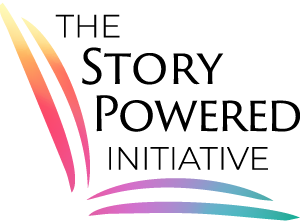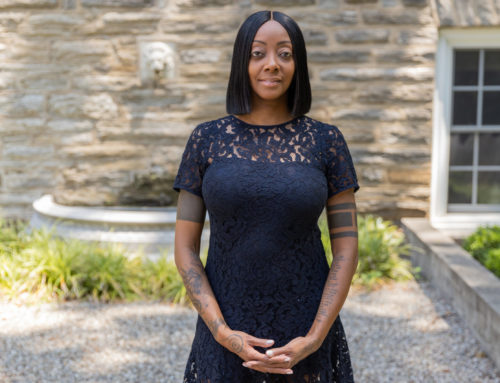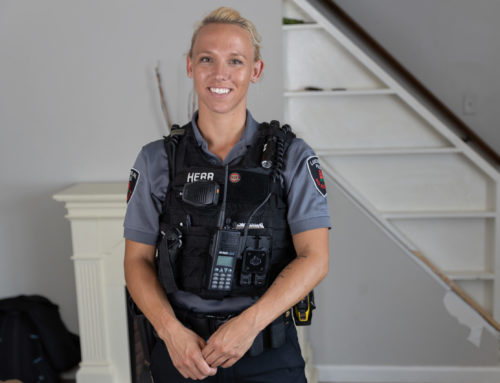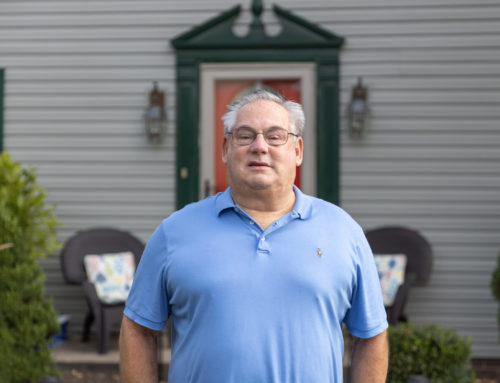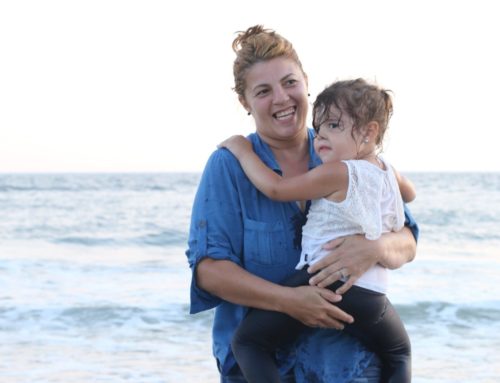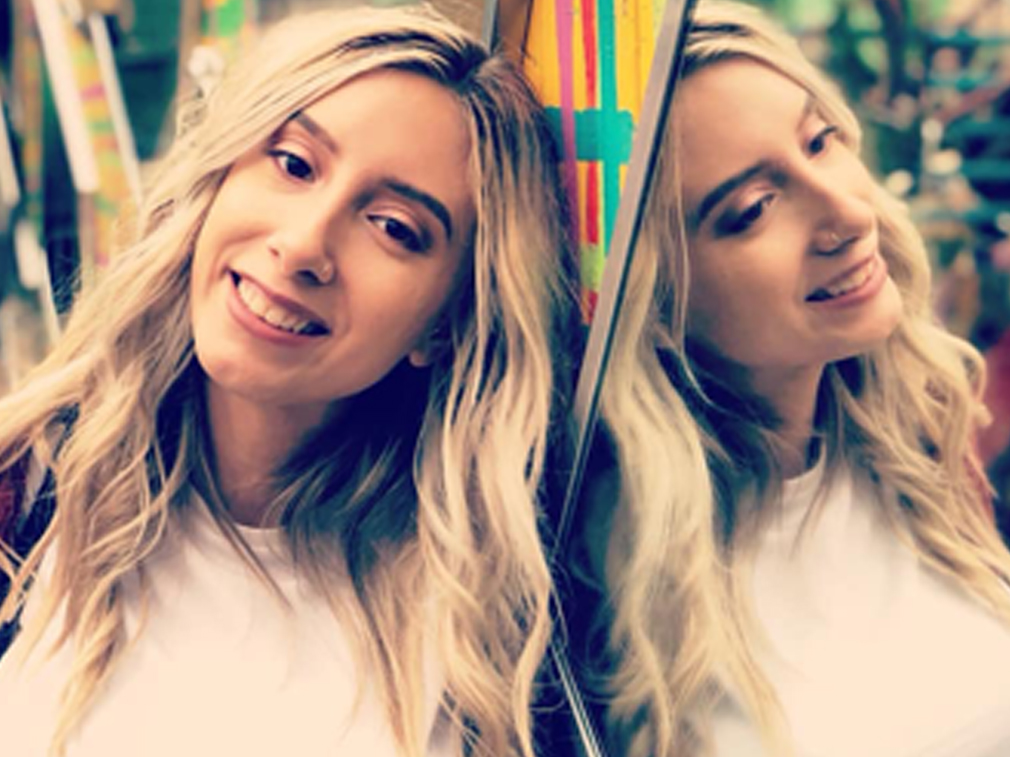
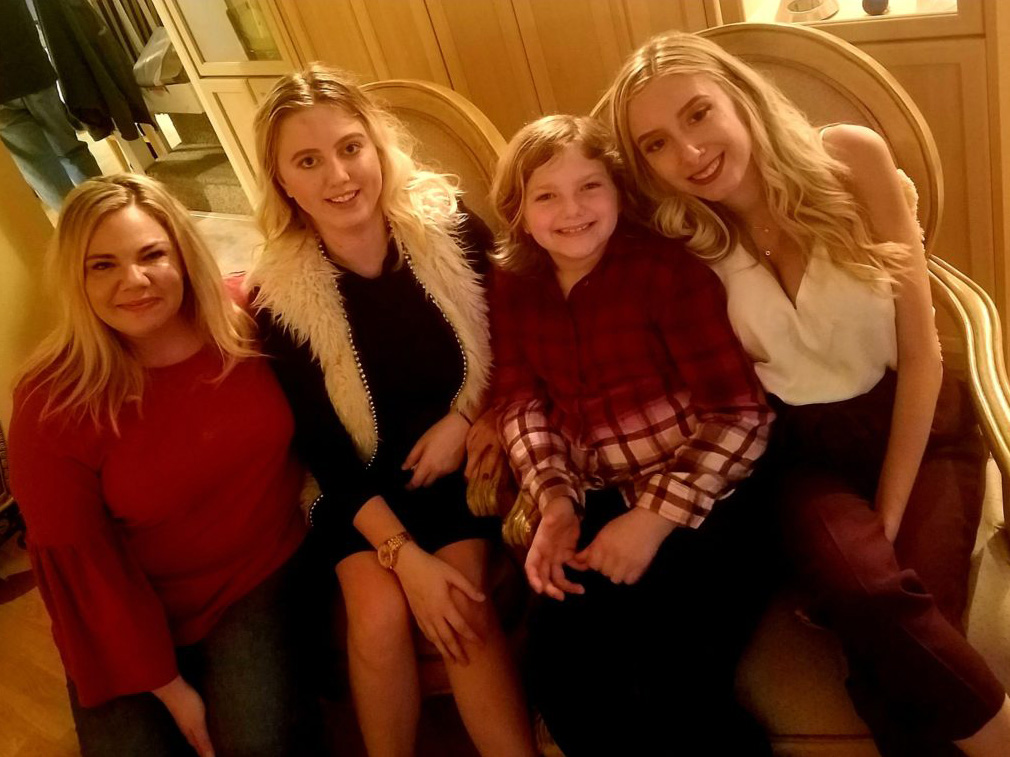
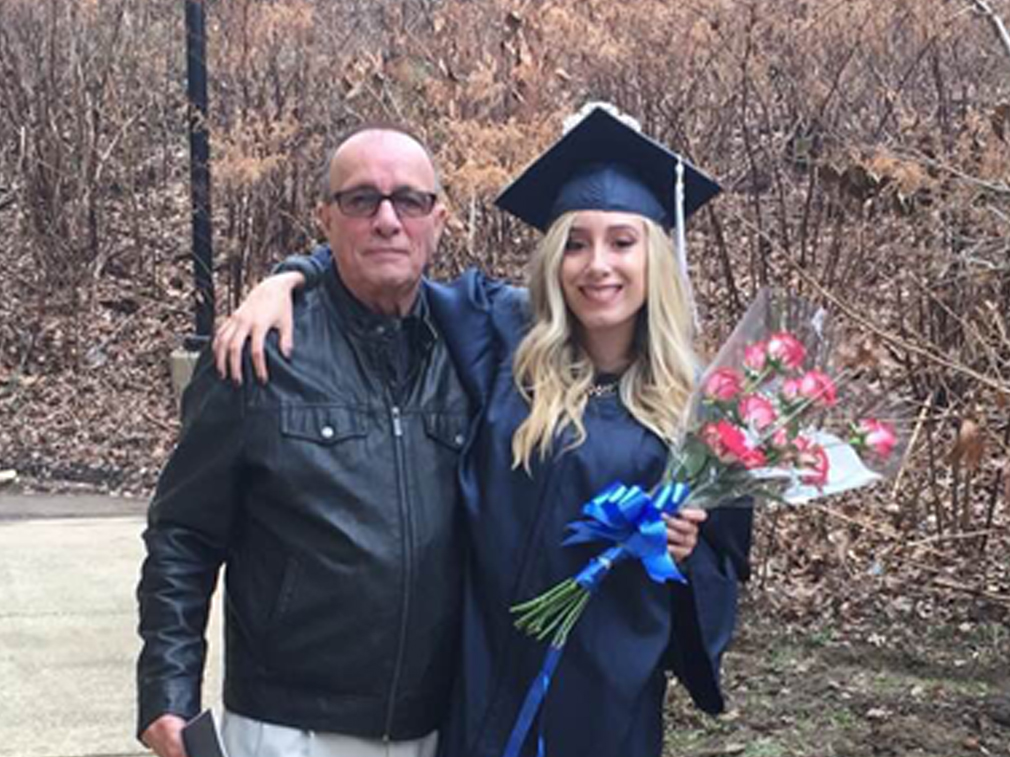
"I was working full time, still enrolled in school, and constantly worrying about whether my mom was dead or alive."
I was born and raised in North East Philadelphia. For most of my life, my household consisted of my mom, my little sister, and me. We moved around frequently, a new apartment almost every two years. Growing up, school was and continues to be my outlet today. School allowed me to escape the anxiety and depression I was facing as a young child. It still allows me to cope with those feelings today. I consider myself nerdy, especially growing up. I was the kid who cried when they didn’t get a hundred on their test. I was involved in student government and drama club. You could say I was an overachiever. I think the drive for perfectionism during my adolescence had a lot to do with my anxiety. It’s ironic that the outlet that was helping me cope with my anxiety was also a symptom of my anxiety. Despite my intense focus on school, I remained social.
My mother and father have a long history with drug use. Due to my dad’s mental health and substance use, he was an absent father. Our relationship was very inconsistent making him almost a stranger. My mom was faced with raising my sister and me alone. However, her mental health and substance use disorder really impacted my life since I was a young child. Even when she was in recovery, she still was affected by her bipolar and borderline personality disorders. Like most people, she had the disadvantage of a dual diagnosis. Her mental health diagnoses impacted her relationship with herself, her relationship with my little sister and me, and her overall daily function. I remember as a kid not understanding her behaviors and being angry and sad that she was not like the rest of the parents I saw.
My mom grew up in Philadelphia as a child as well and was raised by her dad, my grandfather. He was a single dad; my biological grandmother also had an alcohol use disorder. My mom faced the same challenges I did as a kid. I believe my mom started using substances at the age of 11 or 12. Her substance use started out with marijuana and alcohol and eventually progressed to cocaine, pills, and heroin. By the age of 19, her mental health symptoms really became apparent. I believe this is when she began to use drugs to cope with her mental illness. She’s been using substances from the time she started to now, at almost 50 years old. It has been a long road for her and my family and me as well.
During my adolescence, I didn’t know exactly what was going on with my mom, but I knew she was different from the other kids’ parents. My mom frequently slept all day and as a result, she didn’t work. I was often late for school, sometimes even absent, and I knew that wasn’t normal. At the time, my grandparents had children the same age as me and my little sister, and I didn’t see any of this happening with them. When I was about seven, we moved to Bensalem. I say this because I think this is an important aspect of my childhood because this is when I began to make sense of what was happening. My mom began to use drugs every single day, sometimes not even leaving her room. She would often have strange men in the house, and I began to realize that my sister and I weren’t safe. My sister was six at the time, and I began to take on the mom role. I made sure she had dinner and she was up and ready for school, and I looked out for her. This made me grow up quickly, and my sister and I formed a close relationship at a young age.
One day, my mom had asked one of the neighborhood kids to watch us; the girl was 11 at the time. The girl hung out with my sister and I for a little bit and then she went home. When she went home, I think she told her mom that we were home by ourselves, and when her mom found out how young we were, I believe she called the cops. The next thing I knew, the cops were kicking down our door. The cops took my sister and I and failed to tell us where we were going. We waited 16 hours until they took us to our uncle’s house. I didn’t know my uncle and I didn’t want to go there. My mom told the police lies about my grandparents, like that they were physically abusive, so we weren’t allowed to go there. At this time, my grandfather went to court to fight for full custody of us. At the age of eight, my grandparents got full custody. I lived with them for about two years. During this time, I began to see what a normal household looked like. This scared me. For once, someone was taking care of me; I wasn’t taking care of someone else. All I had to do was make my bed, go to school, and do my homework, and the rest was taken care of.
At the age of 11, I asked to go live with my mom. She was in jail for a year and a half since we had separated and was now living in a sober-living house. My mom was doing good, so we got an apartment down the street from my grandparents and lived with her there. Life was relatively normal for a while. We would have family dinners, she would help me with my homework, and we’d just spend time together. Eventually, I began finding needles and empty heroin bags around the apartment. Random people were coming in and out, and she began dating strange men. I remember she would spend so much time sleeping. I was so scared to leave my mom because I didn’t know what would happen to her, so I stayed. My mom was in and out of rehab from the time I was 12 to about 19. She would remain sober, relapse, and then go back to treatment. I felt crazy because I didn’t know if she was manipulating me or telling me the truth. You want to believe your mom because she’s your mom and you love and trust her. This caused me to have severe trust issues, not just with other people, but with myself as well. If you couldn’t trust the ones closest to you, who could you trust? I began to detach from reality at a young age because it was easier than living in the present.
I didn’t talk to many people about my mom’s substance use disorder. I never told my friends, but I think they knew. Sometimes I would lie to cover up that my mom was suffering from these issues. Even at school, I never shared this information with my teachers. My grandparents started speaking to my sister and me about it when we were kids. It was an open discussion of everything between drugs, mental health, and my mom. I enjoyed it because my grandparents didn’t speak to us like we were little kids but rather actual adults. When you’re forced to grow up at a very young age, every normal kid thing seems so ridiculous. My grandparents have always been a huge support for my sister and me. In some sense, I have always looked at them as my parents.
As I progressed through middle school, things started to change. I began to smoke weed and drink heavily on the weekends until I was about 17. These patterns came with negative behaviors, like stealing and breaking into cars, staying out all night, and putting myself in dangerous situations. Eventually, I began to experience severe depression. I didn’t want to confront my own battles because I was so afraid of ending up like my mom. When I stopped going to school my senior year, I was placed into an alternative school. The alternative school was the best thing to happen to me, I received the one on one attention I was desperately craving. In Philadelphia, the school system isn’t the best; there’s fights, drugs, it’s under-staffed, and just complete chaos. At the alternative school, I was able to buckle down and receive the education I needed to graduate high school. Eventually, I entered community college where I started my degree in Psychology.
During this time, my mom had relapsed. We were evicted from our apartment and had to move to a new one. This triggered another relapse. She began to not come home for weeks at a time. She would come home and sleep for days and then go and do the same thing. My sister and I noticed our things were missing, such as jewelry, clothes, and money. I didn’t know what to do, so I began calling hospitals and the police to see if they could help me get my mom into treatment. Both the police and the hospitals said there was nothing they could do. I began to become frustrated because my mom had underlying mental health issues that an institution for these challenges didn’t want to help. I thought to myself, if I, a clear-minded individual, can’t find these resources, how can someone who is on substances find these resources? I just couldn’t grasp the idea that individuals who deal with these issues daily were unable to help my family and my mom. Eventually, my mom found a methadone maintenance therapy program that she was on for four or five years.
During this time, I had been accepted to Penn State Abington and began taking classes. My mom relapsed the worst I have ever seen it. My sister and I made the decision to change the locks and to not allow our her to come back into the house. My mom was missing for a month when I got a phone call that said, “I’m coming home. Are you home?” We had to tell her that she wasn’t allowed home, and this was hard. We told her that we love her, we support her, and we’ll help her get treatment any time. During my first year at Penn State, my home life was very unstable. I was extremely overwhelmed with taking six classes and working 40 hours a week. I entered back into a dark place. I was severely anxious and depressed. I began to think about taking my own life and had several attempts. This is when I realized I needed to take therapy seriously and I started to invest in my own mental well-being. For so long, I was constantly worried about everything and everyone but myself.
After that conversation with my mom, we didn’t hear from her for three months. I was working full time, still enrolled in school, and constantly worrying about whether my mom was dead or alive. The one thing I enjoyed, school, I was failing at. I didn’t tell anyone involved with Penn State Abington why I was doing so terribly in school. On top of this, I am a first-generation college student, so navigating the education system was something I had to do on my own, which made my experience even harder. One night, I got a phone call from my mom after months saying, “Come get me, I need to go into treatment.” I brought her necessities and dropped her off at treatment. It sounds easy, but almost every time she tried entering treatment, she would have to wait days for a place to have a bed. During all her time in treatment, they rarely involved my sister and me, and if they did, it was never helpful. She would come out of rehab and expectations would always fall short, on all ends. I always wonder if we all had the opportunity to be fully engaged in the treatment process if things would be different.
One thing I want to note is that my mom is an amazing person inside and out. Despite her disease, she’s compassionate and empathetic. I remember as a little kid we were always doing things spontaneously. We’d go jump in the rain puddles while it was raining or exercise together, go to amusement parks, and cook dinner. Even when she was using drugs, on some level she was still a great mom to us. I think that’s what makes it so hard to cope with not having her in my life. Some of my best qualities I have are inherited from her. and I love her so much, and I have now learned that she did the best she could have, given all the circumstances. We have little conversations about her substance use and the life we’ve endured because she becomes defensive. I think it’s hard for her to hear the trauma I’ve endured as a result of her substance use. I know she loves me, and I’ll cherish that forever. Through my own therapy, I learned to maintain healthy boundaries. It took a long time for me to learn how to support and love her while protecting my mental well-being. I will always continue to reach out and hopefully one day repair our relationship.
I’ve created a nice environment for me to feel safe in. I moved into a beautiful house, I have a wonderful boyfriend, and amazing dogs. I currently live with my boyfriend, my sister, and her boyfriend. We cook dinner together, we clean together, we have cook-outs together, we make it work. Our house isn’t perfect, but it’s our home. All I ever wanted was to have food in the fridge, a loving family, and a secure, safe home. I finally have that. I worked hard to accomplish this. The little things are what I am most appreciative of: our driveway, a front lawn, a backyard, a nice kitchen, my own bedroom, and a car. I’ve even recently started my own garden, which I am extremely proud of. My sister was always right next to me through everything. Since she was seven years old our bond has been unbreakable. Even as adults, we choose to live together. If I did not have her by my side all the years, I would not have made it. Through thick and thin we managed to be there for each other, support each other, and have each other’s back when no one did.
As for my grandparents, I still talk to them every day and I will always be grateful for the support and love they’ve given me. In our family, we have no filter, so we always are just brutally honest with each other and say anything we want. They’ve taught me I can be anything I want to be and have encouraged me to be the best at it. My grandparents have shown me what a family means. They did their very best to make us feel like our childhood could be great with all the family vacations, Christmases, birthday parties, and just showing up no matter.
Before my current boyfriend, I didn’t believe in love. He’s taught me so much in life. I learned to express my emotions, to be vulnerable, and to really believe I am capable and deserving of having a normal life. I didn’t know what unconditional love was until I met him. Knowing that someone loves you through all your hardship is comforting. He is patient with me, supports me in all my dreams, and is my best friend. He came into my life with no judgement and has been there through every life obstacle and every family crisis. Having him be a steady person in my life for so long has helped me understand that people aren’t always going to disappear in and out of my life.
I recently graduated from Penn State Abington with a degree in Psychological and Social Science in 2018. I’m headed off to graduate school at Rutgers University to major in social work. I currently work for a professor at Penn State Abington, Dr. Glenn Sterner, where I work on the Share Your Opioid Story Initiative, traveling across the state hosting community conversations and attending other events about substance use. My mom’s experience and my own experience has made me interested in disadvantaged communities that face mental health and substance use challenges. I’m especially interested in topics surrounding inequality, racism, and sexism. I hope to have an influence on these policies enacted and the opportunity to educate lawmakers on these issues. I have learned to deal with the cards I have been dealt, but for so many others it is not always the same case. I have acknowledged the way my privilege plays a role in that. The mindset that everyone should “pull themselves up by their bootstraps” is not a sustainable solution. The more we have people who are directly affected by injustices at the table, I think we will begin to see change.
If someone was in a similar situation as me, I would tell them not to be afraid to speak up. Don’t be afraid to tell your friends, your co-workers, or whomever. Start to build your support system so you don’t feel alone, because you’re not. Feel whatever you’re feeling: if you’re angry, scream. It’s okay to set boundaries too. You’re not a horrible person for saying no. You can love them without enabling them. Some days are going to be hard, but it is okay to feel that way. Cherish the good days.
This is why I am sharing my story, to let kids know that even with the odds against you, you can still accomplish your dreams. My childhood traumas do not have to define my future. I suffer from anxiety and depression, but with a good support system, therapy and self-awareness, I can thrive. Coming from the circumstances I did, I know other kids do too, and I want to show them that they can make it in this world. They still can be somebody. The more we talk about it, the more we can heal.
